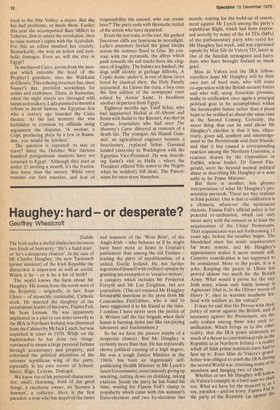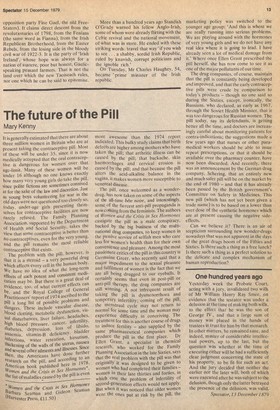Haughey: hard or desperate?
Geoffrey Wheatcroft
Dublin The Irish make a useful distinction between two kinds of humanity: 'He's a hard man', or 'he's a desperate chancer'. In the case of Mr Charles Haughey, the new Taoiseach (prime minister) of the Irish Republic the distinction is important as well as useful. Which is he — or is he a bit of both?
The world knows the facts about Mr Haughey. He comes from the north-west of the Republic — originally, in fact, from Ulster — of staunchly nationalist, Catholic stock. He married the daughter of the penultimate leader of his party, Fianna Fail, Mr Sean Lemass. He was apparently implicated in a plot to run arms covertly to the IRA in Northern Ireland, was dismissed from the Cabinet by Mr Jack Lynch, but was acquitted in court in 1970. While on the backbenches he has done two things: continued to amass a large personal fortune through accountancy and property, and cultivated the political attentions of the extreme republican wing of the party, especially in his own corner of Ireland: Mayo, Sligo, Leitrim, Donegal.
We know too of his personal characteristics: small, charming, fond of the good things, a racehorse owner, an `homme femmes', a collector. Here is the first paradox: a man who has acquired the tastes arid manners of the 'West Brits', of the Anglo-Irish — who behaves as if he might have been more at home in Grattan's parliament than among the old Fenians — leading the party of republicanism, of a united, Gaelic Ireland. He has further ingratiated himself with civilised opinion by granting tax exemption to 'creative writers', a category which includes Mr Frederick Forsyth and Mr Len Deighton, but not journalists. (This act ensured Mr Haughey favourable mentions in the press from Mr Constantine FitzGibbon, who is said to have suggested it to his friend at the time. I confess I have never seen the justice of it. Writers call the fire brigade when their house is burning down just like tax-paying labourers and businessmen.) So far we have the picture maybe of a desperate chancer. But Mr Haughey is certainly more than that. He has repeatedly shown political cunning of a high degree. He was a tough Justice Minister in the 1960s, has been an ingeniously selfpublicising Health Minister in Mr Lynch's latest Government, ostentatiously giving up smoking, cutting down on drinking, taking exercise. Inside the party he has bided his time, waiting for Fianna Fail's slump in popularity which came with this summer's Euro-elections and two by-elections last month; waiting for the build-up of resentment against Mr Lynch among the party's republican Right, which had been expressed secretly by many of the 44 TDs (MPs) of the parliamentary party who voted for Mr Haughey last week, and was expressed openly by Miss Site de Valera TD, latest in line of the fiendish termagants and harridans who have brought Ireland so much grief.
Miss de Valera and the IRA fellowtravellers hope Mr Haughey will be their own sort of hard man, who will cease co-operation with the British security forces and who will, using American pressure, make re-unification once again a principal political goal to be accomplished within the foreseeable future rather than a pious hope to be realised at about the same time as the Second Coming. Certainly, the worst thing that can be said about Mr Haughey's election is that it has, objectively, given aid, comfort and encouragement to the Provisionals and their friends; and that it has caused a corresponding reaction among the Northern Unionists, a reaction shared by the Opposition in Dublin, whose leader, Dr Garret Fitzgerald, went far beyond normal political abuse in describing Mr Haughey as a man unfit to be Prime Minister.
But there is another, less gloomy interpretation of what Mr Haughey's premiership portends. There are two realities in Irish politics. One is that re-unification is a chimera, whatever the nationalist rhetoric. Fianna Fail's official policy is for peaceful re-unification, which can only mean unity with the consent or at least the acquiescence of the Ulster Protestants. That acquiescence was not forthcoming 12 years ago, before the troubles began. The bloodshed since has made acquiescence far more remote, and Mr Haughey's appointment makes it more remote still. Coercive reunification is not supposed to be considered. More to the point, it is a joke. Keeping the peace in Ulster has proved almost too much for the British Army. What would it prove for the tiny Irish army, whose only battle honour is Agincourt (that is, in the Olivier movie of Henry V, shot in wartime southern Ireland with soldiers as the extras)? It may be said that the Provos with their policy of terror against the British, and if necessary against the Protestants, are the only realists among those who seek reunification. Which brings us to the other reality, that the IRA poses ultimately as much of a threat to constitutional rule in the Republic as in Northern Ireland — a reality which all Irish prime ministers have had to face up to. Even Miss de Valera's grand" father was obliged to crush the IRA during the second World war, interning many of its members and hanging two of them. Whether or not Mr Haughey will follow., de Valera's example as a hard man we shal! see. What we have for the moment is, as,' say, paradox — and an irony. Fianna. Fail.1! the party of the Republic (as against he opposition party Fine Gael, the old FreeStaters). It claims direct descent from the revolutionaries of 1798, from the Fenians (the same word as Fianna), from the Irish Republican BrotherhoOd, from the Easter Rebels, from the losing side in the bloody civil war of 1922-3. It is the party of 'Irish Ireland', whose hope was always for a nation of austere, poor but honest, Gaelicspeaking peasant farmers. That is not the land over which the new Taoiseach rules, nor one which he can be said to epitomise. More than a hundred years ago Standish O'Grady warned his fellow Anglo-Irish, some of whom were already flirting with the Celtic revival and the national movement, of what was in store. He ended with these striking words: travel that way `if you wish to see. . . a shabby, sordid Irish Republic, ruled by knavish, corrupt politicians and the ignoble rich.'
On Tuesday, Mr Charles Haughey, 54, became • prime minister of the Irish republic.



































 Previous page
Previous page